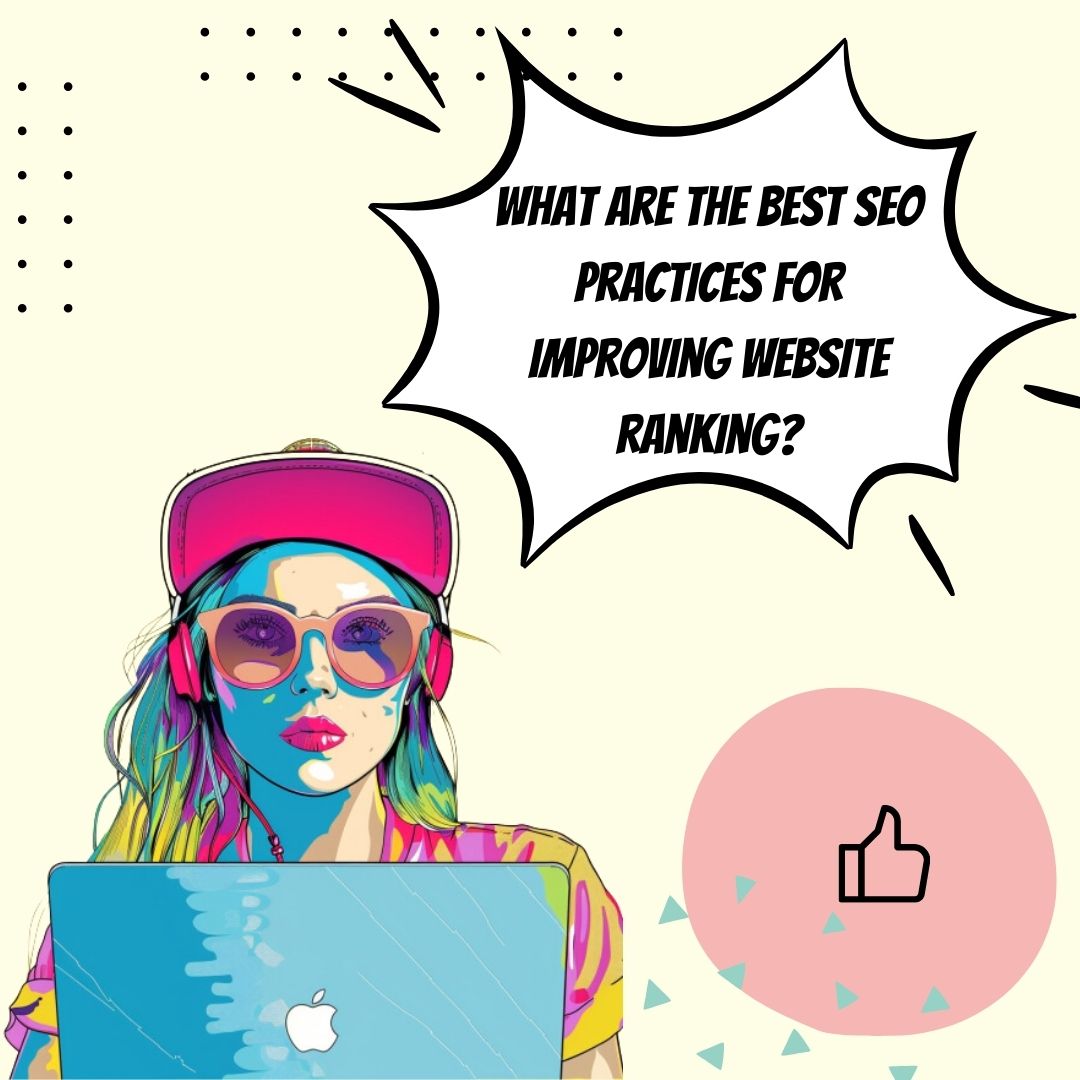Key Takeaways
✅ Identify and Optimize for Relevant Keywords: Delve into keyword research to discover what your audience is really searching for. Embed these golden nuggets naturally in your site to guide folks straight to your content. Remember, the right keywords can boost your site's search rankings and really make a difference to your bottom line.
✅ Create High-Quality, Engaging Content: Your content is your storefront window to the world, so make it count! Craft compelling, useful, and fresh content that keeps visitors thirsty for more. Happy readers often turn into loyal customers, which is always good for business, right?
✅ Build High-Quality Backlinks and Improve Technical SEO: Strong backlinks are like glowing recommendations from the web's influencers. Pair that with a technically sound website—think fast loading times and mobile-friendly design—and you've got a winning combination that search engines love.

Introduction
Ever wondered why your website isn't leading the pack in search results? Navigating the digital jungle can feel like searching for hidden treasure without a map. But here's the good news: I'm about to hand you the map.
SEO isn't just tech wizardry or marketing buzz; it's the lifeblood of your online presence. Getting it right means more eyes on your website and, ultimately, more business. I know, it can be daunting – algorithms change like the wind, and there's always a new trend promising the moon. But stay with me. I've got the lowdown on best practices that'll help you not just chase but actually catch up with those ever-elusive search engine algorithms.
We'll delve into the kind of content that hooks readers and keeps them coming back for more. We'll explore the mysterious world of backlinks and why they're the secret handshake of the internet. Plus, we'll touch on technical SEO—think of it as the behind-the-scenes crew that keeps the show running smoothly.
Are you ready to uncover the secrets that can propel your website into the spotlight, leading to maximum visibility, outstanding traffic, and yes, a chance to skyrocket that revenue/ROAS/ROI? Stick around, because by the time we're through, you'll have a treasure trove of actionable insights and trailblazing information that could very well set your site apart from the rest.

Top Statistics
| Statistic | Insight |
|---|---|
| Global SEO Market Size: Expected to reach $122.97 billion by 2028, at a CAGR of 11.3%. (Source: Grand View Research) | This statistic underlines the rapid expansion and significance of SEO in the digital market landscape. This growth represents not just an opportunity, but a necessity to tap into SEO for your website's visibility and success. |
| Organic Search Traffic: Accounts for 53% of all website traffic. (Source: BrightEdge) | The majority share of website traffic comes through organic search, which tells us that SEO remains an essential practice for attracting visitors to your site. |
| Mobile Search: Mobile devices contribute to over 50% of global website traffic. (Source: StatCounter) | This is a clear message that your SEO strategy needs to be mobile-friendly. If your website isn't optimized for mobile, you could be missing out on more than half of your potential audience. |
| Local SEO: 46% of all Google searches are for local information. (Source: Think with Google) | For any business with a physical location, local SEO can't be ignored. Almost half the searches could lead to local foot traffic and, therefore, customers. |
| Page Speed: 40% of users will leave a website if it takes more than three seconds to load. (Source: HubSpot) | Speed matters. This statistic stresses the importance of quick load times. A fast-loading site can greatly reduce bounce rates and improve user experience. |
Definition of Search Engine Optimization (SEO)
Ever wonder why some websites pop up before others when you're searching online? Well, Search Engine Optimization, or SEO for short, is like the secret sauce that makes that happen. It's all about making your website more attractive to search engines like Google, so people can find you easier. Imagine your website is a shop in a huge mall; SEO is what helps customers find your shop instead of wandering aimlessly.

On-Page SEO Fundamentals
Imagine you're setting the table for a big dinner. Everything needs to be just right so your guests can enjoy their meal. That's on-page SEO. It begins with keyword research - understanding what words people use when they're looking for something you offer. Use these words naturally in your website's title tags and meta descriptions, which are like signposts telling search engines what each page is about. And don't forget about creating compelling content that both humans and search engines will love. Then, make navigating your site a breeze with a clear URL structure and sensible internal linking.
Technical SEO Essentials
Under the hood of your car lies the engine, a complex beast that needs regular checkups for a smooth ride. Technical SEO is your website's engine checkup. It includes speeding things up so web pages load in a snap and making sure your site looks good on phones, which is what we mean by site speed and mobile-friendliness. Plus, it's essential to ensure that search engines can easily understand your website's content and how it's organized, called crawlability and site structure. And don't overlook the administrative tasks like creating XML sitemaps and using robots.txt – they help search engines navigate your site.
Off-Page SEO: Building Authority
You know how a friend's recommendation carries a lot of weight? In the online world, that's what we call backlinks, and they are gold for off-page SEO. Earning links from reputable sites tells search engines that your website is trusted and authoritative. Engaging on social media and claiming your spot on Google's local listings can also boost your visibility and tell search engines that you're a key player in your industry.
Analytics and Measurement
Flying a plane without instruments is risky—you need gauges and dials to tell you how you're doing. The same holds for your website and SEO. Tools like Google Analytics and Search Console give you the inside scoop on how your site performs. They let you peek behind the curtain to see who’s visiting, what they like, and where you might be able to improve. Keeping an eye on these details helps you adjust your SEO strategy to better reach your audience.

Staying Ahead: SEO Trends and Best Practices
SEO's not a one-time deal; it's more like tending to a garden where the conditions keep changing. Search engines often update their algorithms, and your job is to stay in tune with these changes to avoid your website's visibility withering away. Recently, everyone's talking about voice search and making sure their content is structured in a way that machines can understand—hello, structured data! And as new technologies emerge, they could shake up the SEO landscape, so staying informed and agile is key.
By focusing on these aspects of SEO, you'll ensure that your website isn't just a blip on the internet but a shining beacon. Remember, whether you're a seasoned pro or just starting out, keeping your SEO knowledge fresh and your strategies adaptable will pave the way for ongoing growth and success online.
AI Marketing Engineers Recommendation
Recommendation 1: Optimize for Mobile-First Indexing: You've probably heard people constantly glued to their mobile phones, right? Well, search engines have too! In fact, Google now predominantly uses the mobile version of the content for indexing and ranking. In other words, if your site isn't friendly to a user on a smartphone, you might as well be invisible. It’s crucial to ensure your website is fully optimized for mobile devices, with a responsive design that adjusts seamlessly to different screen sizes. A mobile-first strategy can result in better engagement, higher search rankings, and overall more traffic.
Recommendation 2: Create High-Quality, Engaging Content: You know what’s timeless? Stories. People love stories. And that's what your content needs to be—a great story, one that's relevant and adds value. No fluff, no filler. What sets you apart in the vast sea of information? It's authentic, high-quality content that’s useful and interesting to your audience. Align with the latest trends by digging into topics people care about and are searching for right now. Leverage tools like Google Trends or Buzzsumo to stay ahead of the curve. Quality content can help you build trust and authority, which can lead to increased traffic and better SEO results.
Recommendation 3: Leverage AI Tools for SEO Analysis and Improvement: Let's face it: SEO can be like trying to hit a moving target in the dark. But what if I told you AI could turn on the lights? Today, artificial intelligence tools can help you analyze your website's performance, find the right keywords, and even get insights on your competition. Tools like SEMrush or Ahrefs provide a wealth of data-driven insights that can guide your SEO strategy. They can help you understand what's working and what's not, and offer practical suggestions for keywords, backlinks, and content optimization. With AI by your side, you can make smarter decisions and improve the chances of your website ranking well.

Relevant Links
Unleash the Power of AI: A Marketer's Secret Weapon!
- ChatGPT Marketing: A Modern Marketer’s Tool for Creative Content
- Revolutionize Your Google Ads Campaigns with Chat GPT – The AI Tool That Writes High-Converting Texts
- AI Advancements That Are Changing The Game: Boost Your Brand's Digital Presence!
- The Future of Social Media: How AI is Enhancing Engagement Strategies
Essential Guide to Kickstart Your SEO Journey!
- SEO in 2024: Staying Relevant in the Ever-Evolving Digital World
- From Beginner to SEO Pro: Cost-Effective Strategies!
- SEO vs SEM: Understanding the Differences and Synergies for Digital Marketing Success
- SEO Marketing Meaning: Elevate Your Online Presence and Traffic
Metrics that Matter: Tracking Success in the Digital Age!
- The Art of Measuring Marketing Analytics: Why It's More Important Than Ever
- SEO Analytics Uncovered: Optimize Your Strategies for Maximum Impact!
- Revolutionary Analytics Tools & Software: Make Data-Driven Decisions Like a Pro
- The Power of Predictive Analytics in Marketing: Forecasting for Success
Maximizing Profits: Innovative Strategies for Growth and Optimization!
- Profit Optimization Strategies: Unlocking Financial Success
- Revenue Optimization Explained: Key Levers for Maximizing Business Growth
- Securing Consistent Revenue Growth: Strategic Approaches for a Changing Economy
- Boosting Sales Revenue: The Power of Customer Relationship Management
Conclusion
Now, let's take a minute and chew over what we've gone through, shall we? SEO for your website isn't just about sprinkling some magic keywords and hoping for the best. It's kind of like nurturing a garden; it requires patience, the right tools, and a regular check-up. We've dug deep into the rich soil of on-page SEO fundamentals, making sure each page on your site is primed for those curious web crawlers.
But it doesn't stop there. Remember how important those technical foundations are? Just like how a sturdy house needs a solid frame, your technical SEO makes sure that your site's structure is strong, speedy, and mobile-friendly, standing tall even when digital winds blow. And in the bustling market square of the internet, our off-page efforts like building quality backlinks and engaging on social media are your friendly handshakes and signs pointing folks to your digital doorstep.
Tools like Google Analytics and Search Console? That’s your magnifying glass, helping you spot what's working and what needs a tweak or two. And just when you feel like you've got it all sorted, stay on your toes because SEO trends and best practices are a merry dance, constantly evolving as technology strides forward.
So, what do you say? Ready to roll up your sleeves and keep your website glistening in the search engine spotlight? Keep learning, keep optimizing, and ahead of you, let's make sure those search rankings climb, climb, climb. After all, doing SEO for your website isn't a one-time affair—it's your ongoing ticket to the show where your audience awaits.

FAQs
Question 1: What is SEO, and why is it important for my website?
Answer: SEO, short for Search Engine Optimization, is like giving your website a spotlight on the internet stage. It helps your site pop up when people are searching for something you offer. Without it, you're missing out on a bunch of potential visitors who could be loving what you're doing.
Question 2: What are the main components of SEO?
Answer: Think of SEO like a triple-decker sandwich. The first layer is on-page optimization – your keywords and content. The technical SEO stuff, like how fast your pages load, is the middle. And the last layer? Off-page optimization, which includes getting other reputable websites to vouch for yours with backlinks.
Question 3: How do I conduct keyword research for my website?
Answer: Diving into keyword research is like going on a treasure hunt. Your map? Tools like Google Keyword Planner or Ahrefs. Look for words that lots of folks are searching for, but not too many sites are using. That's your sweet spot.
Question 4: How can I optimize my website's content for SEO?
Answer: To jazz up your website's content, sprinkle those keywords you found like seasoning. Make sure they're in your titles, descriptions, and throughout your content. And don't forget to label your images and link to other cool pages on your site.
Question 5: What is technical SEO, and how can I improve it?
Answer: Technical SEO is all about making sure the gears under your website's hood are greased up and running smoothly. Make your website easy to use on phones, quick to load, and simple for search engines to understand. This keeps both visitors and search engines happy.
Question 6: How can I build high-quality backlinks for my website?
Answer: Building backlinks is like networking. Create content that's so good, other sites can't help but share it. Write guest posts, join conversations in your field, and fix broken links - it's all about making friends in the digital playground.
Question 7: How can I track the performance of my SEO efforts?
Answer: Keeping an eye on your SEO is like checking your fitness tracker. Use tools like Google Analytics to see how your traffic is doing, which keywords are getting you noticed, and where you need to up your game.
Question 8: What is local SEO, and how can I optimize my website for local search?
Answer: Local SEO is like being the town hero of the internet. Claim your spot on Google My Business, get your name out on local directories, and make sure your website says exactly where you are and what local folks might be looking for.
Question 9: How can I stay up-to-date with the latest SEO trends and best practices?
Answer: Staying current with SEO is like keeping up with gossip – you've got to be in the right circles. Follow the top SEO blogs, go to webinars and conferences, and chat in SEO forums. It's all about staying in the loop.
Question 10: What are some common SEO mistakes to avoid?
Answer: Watch out for these SEO pitfalls: cramming too many keywords, copying content (search engines hate that), slow websites, ignoring mobile users, or getting shady backlinks. These mistakes can drop your SEO points faster than a lead balloon.

Academic References
- Badrinath, G. R., & Parthasarathy, M. K. (2004). Search Engine Optimization: An Integrated Approach. Journal of Electronic Commerce Research, 5(3), 119-132. This paper explores the need for a cohesive SEO strategy, stressing the inclusion of keyword research, content optimization, and link building as fundamental aspects to improve search engine rankings.
- Al-Shamrani, M., & Al-Khalifa, M. (2017). Search Engine Optimization: A Literature Review. Journal of Computer Science, 13(11), 574-583. A thorough overview of traditional and contemporary SEO practices, examining technical on-page and off-page optimization, and debates the effects of social media on rankings.
- Podnar, K. (2019). The Impact of Social Signals on Organic Search Rankings. Journal of Digital & Social Media Marketing, 7(3), 233-241. This article delves into the relationship between social media interactions and their influence on how websites are positioned by search engines, suggesting strategies for utilizing social media to boost visibility.
- Salman, H. (2018). Mobile-First Indexing and Its Impact on SEO. Journal of Internet Commerce, 17(3), 214-226. Discusses Google's transition to mobile-first indexing and the implications for SEO strategies, underlining the necessity of optimizing for mobile to maintain and improve search relevance.
- Zhang, J., & Ren, Y. (2018). The Impact of User Experience on SEO. Journal of Electronic Commerce Research, 19(2), 100-117. This research focuses on how user experience factors – such as page loading time, navigational structure, and user engagement – influence search rankings and provides approaches for enhancing user experience to gain SEO benefits.







